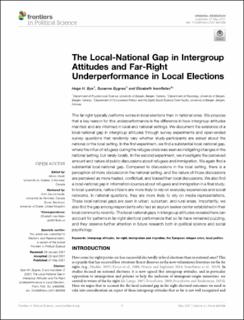The Local-National Gap in Intergroup Attitudes and Far-Right Underperformance in Local Elections
Journal article, Peer reviewed
Published version

Åpne
Permanent lenke
https://hdl.handle.net/11250/2770064Utgivelsesdato
2021Metadata
Vis full innførselSamlinger
Originalversjon
Frontiers in Political Science. 2021, 3, 660088. https://doi.org/10.3389/fpos.2021.660088Sammendrag
The far right typically performs worse in local elections than in national ones. We propose that a key reason for this underperformance is the difference in how intergroup attitudes manifest and are informed in local and national settings. We document the existence of a local-national gap in intergroup attitudes through survey experiments and open-ended survey questions that randomly vary whether study-participants are asked about the national or the local setting. In the first experiment, we find a substantial local-national gap, where the influx of refugees during the refugee crisis was seen as instigating changes in the national setting, but rarely locally. In the second experiment, we investigate the perceived amount and nature of public discussions about refugees and immigration. We again find a substantial local-national gap. Compared to discussions in the local setting, there is a perception of more discussion in the national setting, and the nature of those discussions are perceived as more heated, conflictual, and biased than local discussions. We also find a local-national gap in information sources about refugees and immigration in a final study. In local questions, native citizens are more likely to rely on everyday experiences and social networks. In national questions, they are more likely to rely on media representations. These local-national gaps are seen in urban, suburban, and rural areas. Importantly, we also find the gap among respondents who had an asylum seeker center established in their local community recently. The local-national gaps in intergroup attitudes revealed here can account for patterns in far-right electoral performance that so far have remained puzzling, and they deserve further attention in future research both in political science and social psychology.
